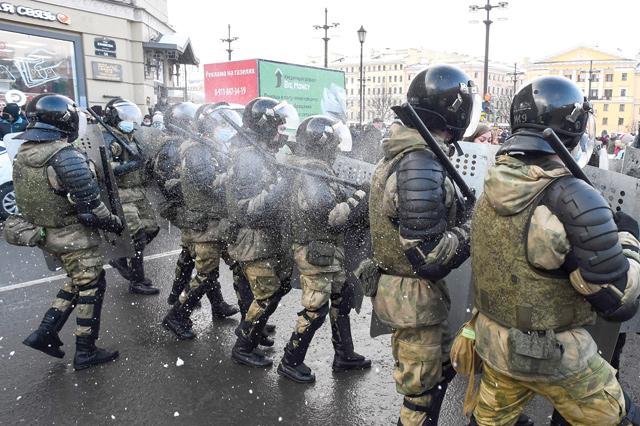- International News
- Tue-2021-02-02 | 03:31 pm

Nayrouz News Agency :
Russian prosecutors on Monday backed a request to imprison opposition leader Alexei Navalny for several years on old embezzlement charges, after police detained a record number of anti-Kremlin protesters across the country.
On Sunday, demonstrators defied government warnings and rallied across the country — including in Moscow and Saint Petersburg where authorities enforced unprecedented lockdowns of the city centre — in a second weekend of mass protests over the arrest of President Vladimir Putin's most prominent opponent.
The protests — stretching from the Pacific port of Vladivostok to the north-western city of Pskov — came ahead of a high-profile court hearing that could see Navalny imprisoned for several years.
Navalny's detention and the crackdown on protesters have sparked an outcry in the West.
EU foreign policy chief Josep Borrell is expected to press the Kremlin to free Navalny when he heads to Moscow on Thursday.
Navalny, 44, is facing charges of violating the terms of a 2014 suspended sentence for embezzlement and could be jailed for two-and-a-half years.
The General Prosecutor's Office said in a statement on Monday that it backed a request by the prison service to change the suspended sentence to jail time.
"This motion is considered lawful and justified," the statement said.
Navalny was detained at a Moscow airport in mid-January after flying back to Russia from Germany where he was recovering from an August poisoning.
He blames the attack with the Novichok nerve agent on Putin and the FSB security agency.
Batons and tasers
The anti-corruption campaigner is being held in a high-security detention centre and faces years of jail time in several different criminal cases, despite calls from Western governments for his release.
Navalny's team has urged his sympathisers to gather in front of the Moscow City Court on Tuesday to show support for the opposition politician, who is expected to appear in person, according to a court spokeswoman.
In recent years, Navalny has served a number of brief jail stints but never a long prison term.
On Sunday, thousands of people rallied across Russia to demand freedom for Navalny and changes to Russia’s political system.
OVD Info, which monitors arrests at opposition protests, said more than 5,400 people had been detained — a record in the history of modern Russia.
Ahead of Sunday’s demonstration, authorities locked down the centre of the capital, with hundreds of police lining the streets, central metro stations closed and restrictions on the movements of pedestrians.
Protesters and monitors pointed to the police’s increasingly harsh tactics, saying they used batons and tasers on peaceful demonstrators, and some were badly beaten.
In Saint Petersburg, a policeman was seen aiming his service weapon at the protesters, while in Vladivostok police used non-lethal weapons against a demonstrator, according to OVD Info.
"Political repression is ramping up,” Leonid Drabkin, top OVD Info coordinator, told AFP.
Putin’s spokesman Dmitry Peskov on Monday defended the clampdown.
"We are talking about unlawful rallies,” he told reporters. "Naturally, police take measures against participants of these unlawful rallies — hence the number of detained.”
‘Path towards trouble’
But the Saint Petersburg ombudsman said authorities unleashed "essentially a military operation” against protesters and paralysed the city.
"Batons and tasers will not solve existing problems. Violence only breeds intransigence and engenders bitterness,” ombudsman Alexander Shishlov said in a statement.
"This is a path towards great trouble. It’s time to stop.”
Kremlin critics say a concerted effort is under way to silence Navalny’s team, dismantle his Anti-Corruption Foundation and pressure his family.
On Monday, a court fined Navalny’s wife Yulia 20,000 rubles ($265) for participating in an "unauthorised” rally in her husband’s support.
Ahead of Sunday’s demonstrations, Navalny’s brother Oleg and several key allies including prominent activist Lyubov Sobol were placed under house arrest until March 23 for allegedly violating coronavirus restrictions and calling on people to join protests.
US Secretary of State Antony Blinken on Twitter condemned "the persistent use of harsh tactics against peaceful protesters and journalists by Russian authorities for a second week straight”.
On Monday, France urged Germany to scrap the Nordstream II gas pipeline project with Russia in protest of Navalny’s detention.













